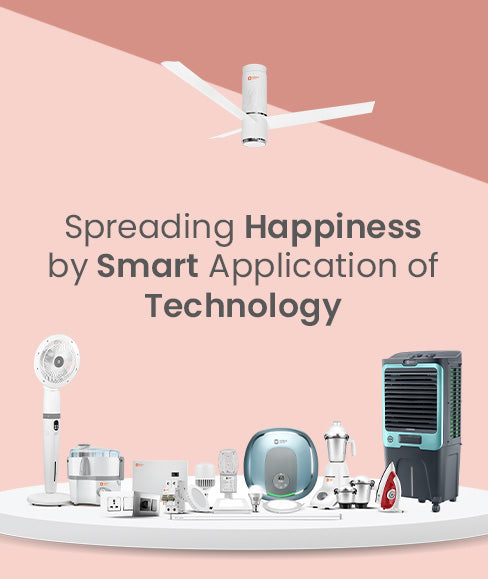
Air Cooler vs Air Conditioner - Which One is Right For You

Summers can be horrific to endure and with temperatures only rising a powerful cooling solution becomes essential. Two common options available in the market are an air cooler and an air conditioner. While both aim to provide efficient cooling they differ in terms of upfront cost, cooling efficiency, working mechanism, electricity consumption, and more.
Now that it is the perfect time to buy a home cooling solution that fits your preferences and needs, the question of which to choose can cloud your mind. Here is a complete guide that will help you make the right choice this season and finally answer the question of which one is right for you: AC vs air cooler? Here is a table that will help you understand the major differences.

Now, let us briefly look at all the points that will help you decide if an AC or an air cooler fits your preferences.
Based on Your Budget
While an AC can keep your space super cool, the cost of buying one can be quite heavy on the wallet. If you're in the market for an AC, you won't find any good ones below the price range of Rs 25,000 to 70,000. However, an air cooler offers a more budget-friendly alternative. You can easily find a good, efficient, and powerful cooler for any space you require in the price range of Rs 5,000 to 15,000.
Based on Maintenance
While the upfront cost of purchasing an AC can be hefty, it's the ongoing maintenance expenses that really add up. Professional assistance is required for installation and maintenance, and yearly servicing can be quite costly. In contrast, an air cooler not only offers affordability and easy installation but also simplicity in maintenance. Just plug it into a power source, fill the tank with water, and switch it on. Maintaining it is super easy too; simply drain out the water and wipe it clean with a cloth. Moreover, its portability makes it easy to move around your house to wherever you desire fresh, cold air.
Based on Electricity Consumption
As mentioned above, the capital cost of an air cooler is lower than that of an AC, and the operating cost of a cooler tells a similar story. A room that requires a 1-ton AC consumes up to 1.5 kW of power per hour of usage, translating to approximately 1.5 units of electricity consumed. If you run your AC for 10 hours on and off, it consumes 15 units of electricity every day. If the cost of one unit of electricity is Rs 10, you'll be paying Rs 150 per day, totalling Rs 4500 every month for just one AC. Imagine operating two ACs with similar costs—that would undoubtedly put a strain on your finances.
On the other hand, a desert cooler consumes up to 0.18 units per hour. If you operate it for 10 hours and the cost of electricity per unit is Rs 10, then you will be just paying Rs 18 per day translating to Rs 540 per month (30 days). This way you can use two coolers in your house and still save a significant amount on your electricity bills as compared to the AC. So, based on cost-effectiveness and energy efficiency, an air cooler is economical and certainly a wise choice.
Based on Air Quality
Air coolers not only cool the space but also enhance the air quality of your room. Utilising the evaporation technique, they draw in warm air from your space, convert it into cool air using water, and expel heat from the environment. Plus, with the option to keep windows and doors open while operating the cooler, you can increase ventilation, ensuring a fresher atmosphere. Models equipped with features like dust filters ensure that no allergens or insects pass through the air delivered to your room, making it a healthier and more comfortable cooling solution. Plus, this appliance comes in different sizes to suit various requirements. High-capacity ones like desert coolers, are incredibly powerful with excellent air throw, capable of efficiently cooling large spaces. There are window coolers for small rooms that circulate fresh air across the room and help save the floor space as it is installed on the windowsills and more.
Air conditioners, too, provide an effective solution for combating intense heat. They operate on refrigeration technology and circulate existing air repeatedly across a closed room. However, this can make the air stagnant and may lead to the accumulation of odours and allergens. As ACs rely on chemicals like chlorofluorocarbons, they can cause airborne diseases and have a negative impact on the environment.
Based on Your Climatic Conditions
As air coolers utilize the evaporation technique to add moisture to the atmosphere for cooling, they are primarily suitable for hot and dry regions. However, for humid areas, certain coolers come equipped with a humid control feature, making them suitable for any climate, whether dry or humid. The versatility of this appliance is remarkable; it can be used in various setups, including inside your room, on your balcony, patio, terrace, or wherever there's a power source, providing a flexible cooling option.
On the other hand, air conditioners offer optimal cooling in any climatic condition. They draw out the moisture from the atmosphere to rapidly lower the temperature. While this ensures comfort, it also poses risks, as the extremely dry air can aggravate allergy symptoms, and asthma and may be harmful to your skin and eyes.
Considering these factors, an air cooler stands out as a compelling choice, offering cost-effectiveness, energy efficiency, portability, easy installation, and effective and healthier cooling. Its capacity to provide relief in any climate and its environmentally friendly operation make it a favourable option for many households. However, an AC shouldn't be dismissed outright, especially for those with the budget and means to afford and maintain it.















